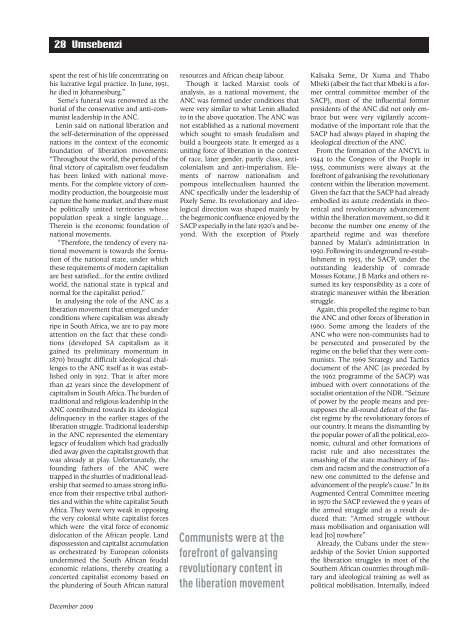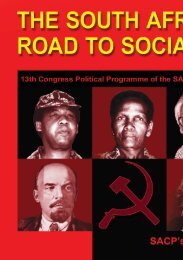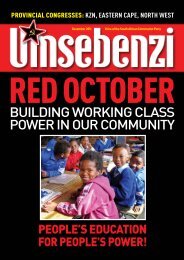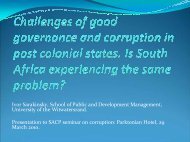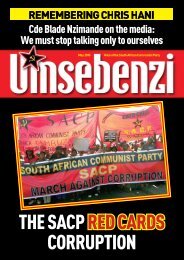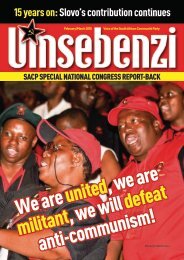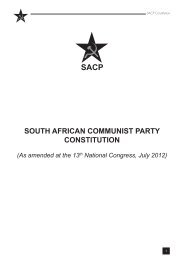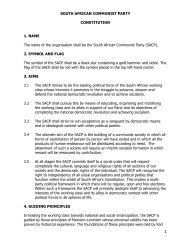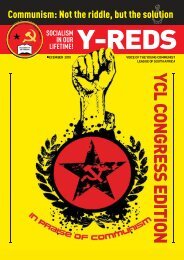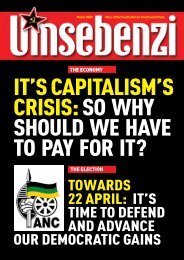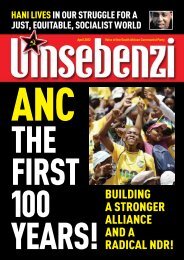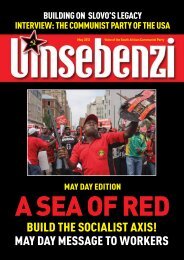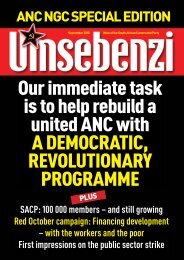Forward to Socialism!! - South African Communist Party
Forward to Socialism!! - South African Communist Party
Forward to Socialism!! - South African Communist Party
Create successful ePaper yourself
Turn your PDF publications into a flip-book with our unique Google optimized e-Paper software.
28 Umsebenzi<br />
spent the rest of his life concentrating on<br />
his lucrative legal practice. In June, 1951,<br />
he died in Johannesburg.”<br />
Seme’s funeral was renowned as the<br />
burial of the conservative and anti-communist<br />
leadership in the ANC.<br />
Lenin said on national liberation and<br />
the self-determination of the oppressed<br />
nations in the context of the economic<br />
foundation of liberation movements:<br />
“Throughout the world, the period of the<br />
final vic<strong>to</strong>ry of capitalism over feudalism<br />
has been linked with national movements.<br />
For the complete vic<strong>to</strong>ry of commodity<br />
production, the bourgeoisie must<br />
capture the home market, and there must<br />
be politically united terri<strong>to</strong>ries whose<br />
population speak a single language…<br />
Therein is the economic foundation of<br />
national movements.<br />
“Therefore, the tendency of every national<br />
movement is <strong>to</strong>wards the formation<br />
of the national state, under which<br />
these requirements of modern capitalism<br />
are best satisfied...for the entire civilized<br />
world, the national state is typical and<br />
normal for the capitalist period.”<br />
In analysing the role of the ANC as a<br />
liberation movement that emerged under<br />
conditions where capitalism was already<br />
ripe in <strong>South</strong> Africa, we are <strong>to</strong> pay more<br />
attention on the fact that these conditions<br />
(developed SA capitalism as it<br />
gained its preliminary momentum in<br />
1870) brought difficult ideological challenges<br />
<strong>to</strong> the ANC itself as it was established<br />
only in 1912. That is after more<br />
than 42 years since the development of<br />
capitalism in <strong>South</strong> Africa. The burden of<br />
traditional and religious leadership in the<br />
ANC contributed <strong>to</strong>wards its ideological<br />
delinquency in the earlier stages of the<br />
liberation struggle. Traditional leadership<br />
in the ANC represented the elementary<br />
legacy of feudalism which had gradually<br />
died away given the capitalist growth that<br />
was already at play. Unfortunately, the<br />
founding fathers of the ANC were<br />
trapped in the shuttles of traditional leadership<br />
that seemed <strong>to</strong> amass strong influence<br />
from their respective tribal authorities<br />
and within the white capitalist <strong>South</strong><br />
Africa. They were very weak in opposing<br />
the very colonial white capitalist forces<br />
which were the vital force of economic<br />
dislocation of the <strong>African</strong> people. Land<br />
dispossession and capitalist accumulation<br />
as orchestrated by European colonists<br />
undermined the <strong>South</strong> <strong>African</strong> feudal<br />
economic relations, thereby creating a<br />
concerted capitalist economy based on<br />
the plundering of <strong>South</strong> <strong>African</strong> natural<br />
resources and <strong>African</strong> cheap labour.<br />
Though it lacked Marxist <strong>to</strong>ols of<br />
analysis, as a national movement, the<br />
ANC was formed under conditions that<br />
were very similar <strong>to</strong> what Lenin alluded<br />
<strong>to</strong> in the above quotation. The ANC was<br />
not established as a national movement<br />
which sought <strong>to</strong> smash feudalism and<br />
build a bourgeois state. It emerged as a<br />
uniting force of liberation in the context<br />
of race, later gender, partly class, anticolonialism<br />
and anti-imperialism. Elements<br />
of narrow nationalism and<br />
pompous intellectualism haunted the<br />
ANC specifically under the leadership of<br />
Pixely Seme. Its revolutionary and ideological<br />
direction was shaped mainly by<br />
the hegemonic confluence enjoyed by the<br />
SACP especially in the late 1920’s and beyond.<br />
With the exception of Pixely<br />
<strong>Communist</strong>s were at the<br />
forefront of galvansing<br />
revolutionary content in<br />
the liberation movement<br />
KaIsaka Seme, Dr Xuma and Thabo<br />
Mbeki (albeit the fact that Mbeki is a former<br />
central committee member of the<br />
SACP), most of the influential former<br />
presidents of the ANC did not only embrace<br />
but were very vigilantly accommodative<br />
of the important role that the<br />
SACP had always played in shaping the<br />
ideological direction of the ANC.<br />
From the formation of the ANCYL in<br />
1944 <strong>to</strong> the Congress of the People in<br />
1955, communists were always at the<br />
forefront of galvanising the revolutionary<br />
content within the liberation movement.<br />
Given the fact that the SACP had already<br />
embodied its astute credentials in theoretical<br />
and revolutionary advancement<br />
within the liberation movement, so did it<br />
become the number one enemy of the<br />
apartheid regime and was therefore<br />
banned by Malan’s administration in<br />
1950. Following its underground re-establishment<br />
in 1953, the SACP, under the<br />
outstanding leadership of comrade<br />
Mosses Kotane, J B Marks and others resumed<br />
its key responsibility as a core of<br />
strategic maneuver within the liberation<br />
struggle.<br />
Again, this propelled the regime <strong>to</strong> ban<br />
the ANC and other forces of liberation in<br />
1960. Some among the leaders of the<br />
ANC who were non-communists had <strong>to</strong><br />
be persecuted and prosecuted by the<br />
regime on the belief that they were communists.<br />
The 1969 Strategy and Tactics<br />
document of the ANC (as preceded by<br />
the 1962 programme of the SACP) was<br />
imbued with overt connotations of the<br />
socialist orientation of the NDR. “Seizure<br />
of power by the people means and presupposes<br />
the all-round defeat of the fascist<br />
regime by the revolutionary forces of<br />
our country. It means the dismantling by<br />
the popular power of all the political, economic,<br />
cultural and other formations of<br />
racist rule and also necessitates the<br />
smashing of the state machinery of fascism<br />
and racism and the construction of a<br />
new one committed <strong>to</strong> the defense and<br />
advancement of the people’s cause.” In its<br />
Augmented Central Committee meeting<br />
in 1970 the SACP reviewed the 9 years of<br />
the armed struggle and as a result deduced<br />
that: “Armed struggle without<br />
mass mobilisation and organisation will<br />
lead [<strong>to</strong>] nowhere”<br />
Already, the Cubans under the stewardship<br />
of the Soviet Union supported<br />
the liberation struggles in most of the<br />
<strong>South</strong>ern <strong>African</strong> countries through military<br />
and ideological training as well as<br />
political mobilisation. Internally, indeed<br />
December 2009


